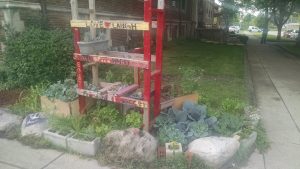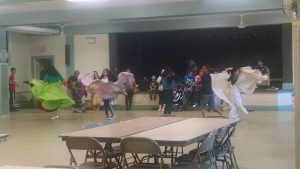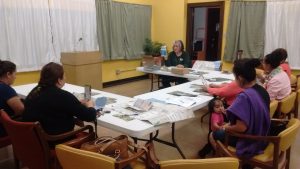Faith and Health Leadership: Best Practices
The Quinn Center, Maywood
Taking Initiative for Healthy Lifestyles
The Quinn Center in Maywood was created in 2010, when St. Eulalia Catholic Church asked the community how they could use the building to save it from demolition and sustain it.
Overseen by Gabriel Lara, the Quinn Center went to the community to assess their needs. At that time, the church had 2 main food programs: a soup kitchen every Tuesday and a food pantry. These programs drew many individuals but served and distributed very unhealthy food. Like many feeding programs, “the bags of food were bad for people, especially those with diabetes,” said Lara. So the church hired an intern from UIC to survey the recipients, their needs and their motivations.
The survey’s ‘skills’ section revealed many of the individuals – mostly women – were excellent cooks and had aspirations in that field. Ten of the 24 women surveyed wished to open their own business preparing food; and here the Quinn Center saw an opportunity. They opened the building’s facilities to help people learn how to produce and prepare food in a healthy way. Thus began a 4-year project on healthy eating, healthy cooking, and a ‘business incubator’: a catering company called Mujeres Unidos.
The Quinn Center was also growing food on its land. In a partnership with Proviso [Township] Partners for Health, they started a community garden 3 years ago in the hope that kids would see how vegetables are grown. Now, having adults on board, they get to use the vegetables to see how they are cooked through cooking classes offered at the Quinn Center.
The program coordinator, Mercedes Hernandez, admits the garden adds a lot to their healthy eating. “When we want a salad, we go out and cut it and bring it in and make it – it’s healthy and REALLY fresh. I used to make smoothies with whatever vegetables I could find, but when I offer to my kids, they wouldn’t eat it. I wanted to find a way for my kids to like it.”
Broadening their Impact
There are now 24 women who cook with Mujeres Unidas. Now in the spotlight, the parents realized they wanted to be models for the children to live active lifestyles. The women started Zumba classes for themselves and dance classes for the kids. “Especially me,” says Hernandez, “we need the Zumba. We need it, because when we do it we have more energy. Especially at my age…we need the energy.” In addition to Zumba and dance, the children have begun a yoga group that has grown to 7 participants.
At some point, a dietician visited the dance class and noted that 90% of the dancers were overweight. “The dietician said that if they are really active and dancers, then their eating must be really, really bad,” says Hernandez. “So we talked to the parents, saying if they are committing their kids to dancing, they need to commit to the other parts at home to follow through. We didn’t want to tell the parents that ‘your kids are going to have diabetes,’ but if you are in the African American and Latino community, you need to know the consequences of the diet you are eating.”
This new realization led to a change in policy at the Quinn Center. “There was a small grant for the women’s project to talk about policy change at the organization level. At the soup kitchen and food pantry, the easiest thing to do was to limit the sugar drinks. It was the easiest thing to do, but it caused a lot of discussion and dialogue,” says Lara.
In the dialogue, Quinn Center participants identified the desire to have the policy impact the wider community. So they added a building policy for groups who rent space at the Quinn Center; water, coffee or tea are welcome, but if a renter wants to bring in sugary drinks, there will be an additional fee assessed.
Quinn’s participants are also interested in getting acquainted with their elected officials and sharing their support for policy change in regards to sugary drinks and healthy living in their community – and teaching healthier habits in the process.
“This is a great place to learn. First, my kids are here, and they are learning. Then, I was working here as a cleaning person, but I was also learning. Especially my English…also computers, computers, business, dancing, art… but especially they are learning to socialize with all kinds of races. Which is what we want – to come hear and get to know each other, learn from each other, our cultures. I can come here all day and I don’t feel tired.”
The inherent beauty in the Quinn Center is the fact that it is engaging the whole family. “In other places, I was always wondering of the parents, ‘where are their kids’?” says Hernandez. “But here, I know they are here and so are their kids…in the dance group, or other classes…The community aspect I didn’t see at first, but it’s so strong.”
“Now that we have the programming,” says Lara, “we see the need for having more male role models, more men involved.”
Fifty percent of the program participants in the Quinn Center are parish members and the other half are not. St. Eulalia pays for only one staff person – Lara himself – and Mercedes’ work as program coordinator is not fully funded. Lara says the work has challenges, especially funding. But he is always creatively looking for new ways to build the community and its assets. “We haven’t overcome [the challenges] completely, but one way is we share resources with others – we have a gym, you can bring your gym but bring staff too.”






